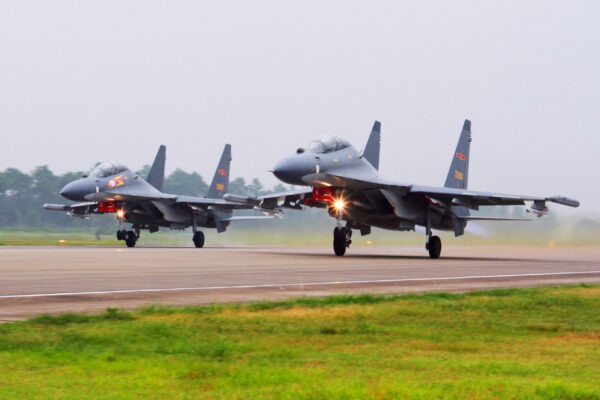China Becoming ‘More Aggressive’ in Pacific, Gen. Milley Says
China’s military has become more aggressive and dangerous over the past five years, the top U.S. general asserted on July 24.Gen. Mark Milley, chairman of the Joint Chiefs of Staff, told reporters during a trip to Indonesia that the United States and its allies have conducted more and more intercepts of Chinese aircraft and ships in the Pacific. The number of unsafe encounters has also increased significantly, he said. “The message is the Chinese military, in the air and at sea, have become significantly more and noticeably more aggressive in this particular region,” said Milley, who recently asked his staff to compile details about interactions between China and the United States and others in the region. The Chinese military has become “noticeably more aggressive in this particular region,” he also told the Financial Times. Milley spoke with The Associated Press and the Financial Times aboard his aircraft as he was flying to visit the Indo–Pacific over the weekend. Milley, who has faced congressional blowback for holding two phone calls with a top Chinese general during the waning months of the Trump administration, didn’t provide specific figures about incidents involving Chinese jets or ships. But, in one example, a Chinese J-6 fighter jet in May flew close to an Australian P-8 Poseidon spy plane and released chaff—pieces of metal debris to confuse enemy radar—that was sucked into the Australian plane’s engines, Australian officials said. “The intercept resulted in a dangerous maneuver which posed a safety threat to the P-8 aircraft and its crew,” Australia’s military said last month about the encounter. Threats to the Region U.S. military officials have recently raised alarms about the possibility that the Chinese Communist Party (CCP) could invade Taiwan amid speculation the CCP could take inspiration from Russia’s invasion of Ukraine. The CCP has stepped up its military provocations against Taiwan in 2022 as it looks to intimidate it into assimilating with the communist mainland. Two Chinese SU-30 fighter jets take off from an unspecified location to fly a patrol over the South China Sea, in an undated file photo. (Jin Danhua/Xinhua via AP) Milley also made note of an agreement between the CCP and the Solomon Islands that will allow Beijing to potentially construct a naval base in the South Pacific region. “This is an area in which China is trying to do outreach for their own purposes. And again, this is concerning because China is not doing it just for benign reasons,” Milley told reporters. “They’re trying to expand their influence throughout the region. And that has potential consequences that are not necessarily favorable to our allies and partners in the region.” He said that the “vast majority” of countries in the Pacific want the U.S. military to be more involved amid the CCP threat. “We want to work with them to develop interoperability and modernize our militaries collectively, in order to make sure that, geostrategically, we’re able to meet whatever challenge that China poses,” he said, according to the FT. Earlier this month, two Republican congressmen again asked Milley’s office to provide more details about two phone calls he had with a top Chinese general, including one on Jan. 8, 2021. They said that the general may have usurped civilian control of the military and said that he “has yet to respond” to their questions. The Associated Press contributed to this report. Breaking News Reporter Follow Jack Phillips is a breaking news reporter at The Epoch Times based in New York.

China’s military has become more aggressive and dangerous over the past five years, the top U.S. general asserted on July 24.
Gen. Mark Milley, chairman of the Joint Chiefs of Staff, told reporters during a trip to Indonesia that the United States and its allies have conducted more and more intercepts of Chinese aircraft and ships in the Pacific. The number of unsafe encounters has also increased significantly, he said.
“The message is the Chinese military, in the air and at sea, have become significantly more and noticeably more aggressive in this particular region,” said Milley, who recently asked his staff to compile details about interactions between China and the United States and others in the region.
The Chinese military has become “noticeably more aggressive in this particular region,” he also told the Financial Times. Milley spoke with The Associated Press and the Financial Times aboard his aircraft as he was flying to visit the Indo–Pacific over the weekend.
Milley, who has faced congressional blowback for holding two phone calls with a top Chinese general during the waning months of the Trump administration, didn’t provide specific figures about incidents involving Chinese jets or ships.
But, in one example, a Chinese J-6 fighter jet in May flew close to an Australian P-8 Poseidon spy plane and released chaff—pieces of metal debris to confuse enemy radar—that was sucked into the Australian plane’s engines, Australian officials said.
“The intercept resulted in a dangerous maneuver which posed a safety threat to the P-8 aircraft and its crew,” Australia’s military said last month about the encounter.
Threats to the Region
U.S. military officials have recently raised alarms about the possibility that the Chinese Communist Party (CCP) could invade Taiwan amid speculation the CCP could take inspiration from Russia’s invasion of Ukraine. The CCP has stepped up its military provocations against Taiwan in 2022 as it looks to intimidate it into assimilating with the communist mainland.

Milley also made note of an agreement between the CCP and the Solomon Islands that will allow Beijing to potentially construct a naval base in the South Pacific region.
“This is an area in which China is trying to do outreach for their own purposes. And again, this is concerning because China is not doing it just for benign reasons,” Milley told reporters. “They’re trying to expand their influence throughout the region. And that has potential consequences that are not necessarily favorable to our allies and partners in the region.”
He said that the “vast majority” of countries in the Pacific want the U.S. military to be more involved amid the CCP threat.
“We want to work with them to develop interoperability and modernize our militaries collectively, in order to make sure that, geostrategically, we’re able to meet whatever challenge that China poses,” he said, according to the FT.
Earlier this month, two Republican congressmen again asked Milley’s office to provide more details about two phone calls he had with a top Chinese general, including one on Jan. 8, 2021. They said that the general may have usurped civilian control of the military and said that he “has yet to respond” to their questions.
The Associated Press contributed to this report.












